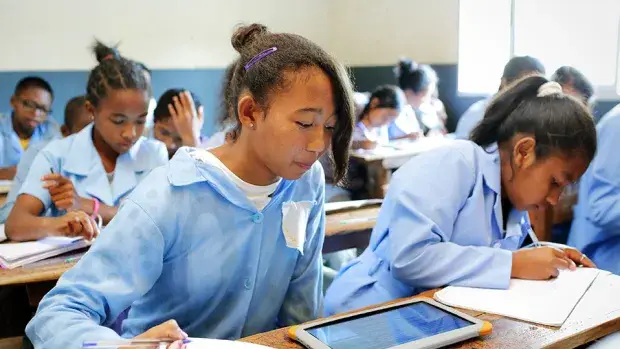When we say “school” what do you think about? Blackboards, books, and stationary? For us, school also means digital tablets that we give to schools in Africa, which often have no books or an internet connection. At these schools more than 500,000 children can now access essential educational content using tablets. Beginning with a handful of initiatives in 2014, this project has become a fully-fledged digital education drive: the "Digital Schools" program.
Primarily, it's a kit that includes a mini server of educational content connected to 25 tablets. We give each school tablets (25), a laptop, a video projector, a Bluetooth speaker, and many accessories. The children use them to instantly access hundreds of items of essential content: books from the school curriculum and also:
- Khan Academy lessons
- the Wikipedia encyclopedia
- the Wiktionary dictionary
- the Gutenberg project, a library with more than 42,000 free digital books in English
- online MOOC courses
- Nomad Education quizzes
- educational content from the YouScribe library
- Africatik application
- Math Matthews
- Plume writing application
- Vikidia
- Education et Numerique resources, etc.
We create these programs in partnership with the Ministry of Education in each country. They work with us to identify the most appropriate school text books for their pupils, which we then upload into the kit.
Our employees volunteering in the field
Because we are convinced that the human factor is central to digital solidarity, we train educational representatives in how to use the kits. Our volunteer employees mentor the schools in their region and deliver training and technical support for the teachers and pupils.
16 countries, 1,400 schools, 500,000 pupils
In 2014 our Digital Schools program included 100 schools in 5 countries: Madagascar led the way, then Senegal, Niger, Cameroon and Tunisia and other countries joined the adventure. In 2021/2022, 500,000 pupils benefited from the digital education program. How many in the future?
Find out about our programs

